
Anno 701 - 800

|
Popes on Parade Anno 701 - 800 |
POPshop |
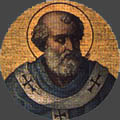 |
Saint Sergius IAnno 687-701 |
A Syrian from Antioch, Sergius was educated in Palermo, Sicily. Son of Tiberius. After a rocky election, Sergius settled down as Pope to great popular acclaim. He paid particular attention to the development of the English Church. The somewhat maniacal Emperor Justinian II called and ran roughshod over a Council in Constantinople (the so-called "Quinisext" Council) that proclaimed the primacy of the Patriarch of Constantinople. Needless to say, Sergius refused to have anything to do with the Quinisext Decrees. Justinian ordered Sergius' arrest, but the Imperial armies in Rome rallied to the Pope's defense. Shortly thereafter, Justinian was himself deposed, and the Quinisext Decrees were quietly forgotten. Sergius added the Agnus Dei to the mass. |
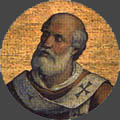 |
John VIAnno 701-705 |
A Greek. Virtually nothing is known about his early life. The Byzantines sent a new Exarch to Ravenna, a Sicilian named Theophylact. The Italians, taking history as their guide, decided that this Theophylact was up to no good. Local militias from all over (non-Lombard) Italy flocked to Rome to protect "their" Pope. The Pope wasn't too thrilled to be caught in the middle of this, and he convinced the militias to go home. He probably wished he hadn't. Oh, Theophylact turned out to be a pussycat, but that quickly turned into a problem. The Lombards invaded Byzantine Italy, taking a number of towns subject to the Pope, and Theophylact did nothing to protect Imperial (and Papal) territories. |
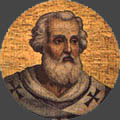 |
John VIIAnno 705-707 |
Another Greek, the son of a distinguished family. The Lombards, busy with their own internal politics, didn't invade, and actually gave back a few of the towns they'd taken from the previous Pope John. In Constantinople, the (somewhat maniacal) Emperor Justinian II took back the Byzantine throne. He resurrected the Anti-Papal Quinisext Decrees and sent them to Rome, demanding Papal approval. John, brighter than he was brave, sent the decrees back but "forgot" to sign them. John convinced the English clergy to give up secular clothing and adopt the Roman collar and cassock. |
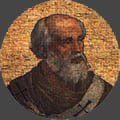 |
SissiniusAnno 708 |
A Syrian. Sissinius was old and so crippled with gout he couldn't even feed himself. Twenty days after his consecration, he dropped stone cold dead. |
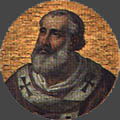 |
ConstantineAnno 708-715 |
A Syrian, son of John. Constantine's pontificate can be neatly divided in half. During the first half, Rome was in the grip of a horrible famine. During the second half, they enjoyed bumper crops. Justinian, tired of Popes prevaricating, refusing to sign his decrees, or just dropping dead, summoned the Pope to Constantinople. Everywhere he went, Pope Constantine was hailed as a hero: parades were thrown in his honour, and he was invited to all the best parties. When Pope and Emperor finally met, they greeted each other as fast friends. The Pope agreed to approve of those of the Quinisext Decrees that did not violate Church dogma or Papal privileges, and the Emperor agreed to be happy with that. The Pope returned to Rome only to learn that Justinian had been overthrown (again), and the new Emperor, Philippicus Bardanes, had it in his head to revive the Monothelite heresy from the dead. Things heated up quick, with both sides preparing for the use of force. Fortunately, the new Emperor died quite suddenly, and his successor Anastasius patched things up. |
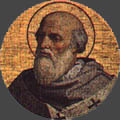 |
Saint Gregory IIGregorio Savelli |
A Roman from a wealthy family; son of Marcellus and Honesta. Gregory is the first Papal Librarian we know by name, and the first elected Pope. Pro-Byzantine, Gregory nevertheless ran afoul of Emperor Leo III on several points. When Leo attempted to levy huge taxes throughout Italy between 717 and 726, the Pope led the resistance. He so annoyed the Emperor, that Leo tried to depose him and, when that didn't work, to have him assassinated. That didn't work either. When the Lombards tried to attack Rome, Gregory went to meet them in full Papal vestments and convinced them to go home. Gregory dispatched the English monk Boniface "to the wild nations of Germany" to convert them and organize a German episcopate. Gregory's biggest challenge, however, was a new heresy supported by the Emperor: Iconoclasm. While the Emperor smashed statues and sacred icons, nothern Italy rose up in revolt against him in support of the holy images. The Lombards took advantage of the confusion to mount another attack against Imperial pretensions in Italy. |
 |
Saint Gregory IIIAnno 731-741 |
A Syrian priest. Gregory was elected by acclaimation and was the last Pope to seek confirmation from a Byzantine Emperor. Confirmation securely in hand, Gregory proceded to condemn Iconoclasm as heresy and to excommunicate all who supported it. Leo was enraged, and he dispatched a fleet to Rome with orders to arrest the Pope. The fleet was shipwrecked. The Emperor siezed some bishoprics in southern Italy and Sicily, but he was forced to call a truce. The Lombards had taken Ravenna, the Imperial capital in Italy, and Imperial forces were in retreat all over the peninsula. The Pope threw his support behind the Byzantine Exarch of Ravenna, organizing a coalition of rebel Lombard Dukes against the Lombard King Luitprand. It wasn't enough; though Ravenna was recaptured, the rebel Duchies were broken and the Pope's four defensive fortresses were taken, leaving only the city walls to hold back the Lombards. In desperation, the Pope appealed to the Franks, but they had allied with Luitprand against the Arabs in Spain and so wouldn't help. Not for the first time, things were looking pretty bleak. |
 |
Saint ZacharyAnno 741-752 |
A Greek born in Calabria. Son of Polichronius. Zachary was elected during the Lombard siege of Rome, perhaps not the most auspicious of beginnings. To make peace, Zachary sold out his ally, the Lombard Duke of Spoleto, and went to meet with King Luitprand personally. Zachary, whatever else he might have been, was a smooth talker. He somehow convinced the Lombards to make peace, return the conquered towns and fortresses, and give the Papacy an additional four towns. Combined with some Byzantine concessions, this made the Pope the ruler of the so-called Duchy of Rome, an area roughly equivalent to the modern region of Latium. Meanwhile, Byzantine Emperors came and went, some Iconoclast. some not. The Pope, looking perhaps for a more stable protector, supported Pepin the Short in his bid to overthrow the last Merovignian King, Childeric III. Zachary is the last Greek elected Pope. |
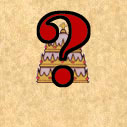 |
Stephen IIAnno 752 |
Stephen II was duly elected, but before he could be installed as Pope, he quite suddenly dropped dead. In 1958 his name was removed from the official lists and subsequent Stephens duly renumbered, causing no end of confusion amongst Stephen afficianados. |
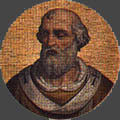 |
Stephen II (III)Anno 752-757 |
A Roman, Stephen was elected Pope by acclamation. The Lombards had a new King, Aistulf, who was determined to bring all of Italy under his power. Stephen sent desperate letters to the Exarch in Ravenna, but Ravenna had already been conquered by the Lombards. So much for the Byzantine Exarchs. Pope Stephen then asked for help from the Emperor in Constantinople, but there was no response. Finally, the Pope himself went to see the Frankish King Pepin to remind him of how he became King in the first place. Pepin got the message and led his armies across the Alps. The Lombards proved no match agains the Franks who (a) actually had a real army (as opposed to, say, the Pope), and (b) had just spent two generations honing their skills against the Moorish invaders in Spain. Aistulf promised on a stack of Bibles to restore the Papal lands. The fact that he didn't only goes to show that some people can't take a hint. Once more, the Pepin led the Frankish armies into Italy. This time, he simply slaughtered the Lombard armies and gave a huge chunk of their lands to the Pope. Laying the foundation of 1100 years of temporal rule, the Papal States granted to Pope Stephen by King Pepin included all of the "Duchy of Rome" as well as most of the former Byzantine lands once belonging to the Exarch of Ravenna, about a quarter of Italy in all. The moment Pepin left Italy, Aistulf began gathering his armies for another attack on Rome, but he quite suddenly (and conveniently) died. |
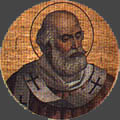 |
Saint Paul IAnno 757-767 |
Stephen and his policies were so popular and so effective, that upon his death the Romans elected his younger brother as Pope, hoping for more of the same. What they got, surprisingly, was more of the same, only better. The Franks kept the Lombards in line, and the Pope spent his time combating the Iconoclast heresy, currently championed by the Byzantine Emperor Constantine Copronymus. All was well until the Lombards allied with the Emperor, and the Emperor threatened to send a fleet against the Pope to recover the lands of the Exarchate. Once again, the Franks came to the rescue, threatening the Lombards with a fresh thumping. The Lombards saw the light and joined an anti-Byzantine alliance with the Pope and Pepin. The Byzantines, in the face of actual resistance, called off the invasion. |
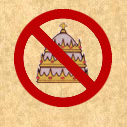 |
Constantine II(Antipope) |
During Pope Paul's final illness, a certain Toto of Nepi gathered a group of Tuscan bandits and made his way to Rome. They had surprisingly little trouble seizing power, imprisoning the chief civil authority of Rome, the primicerius Christopher. Toto installed his brother Constantine as Pope. For nearly a year, they ruled Rome together as a sort of bandit kingdom. After almost a year of living under this debaucharchy, a group of Romans arranged for Christopher's escape. He made his way north and convinced the Lombards to help him overthrow Constantine (and his little dog, too). |
 |
Philip(Antipope) |
The Lombards made good on their promise to "remove" the antipope. Being Lombards, they did this by installing one of their own, a monk named Philip. Once the Lombards had left, Philip didn't last long. |
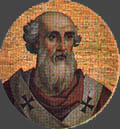 |
Stephen III (IV)Anno 768-772 |
Born about 720 in Sicily; the son of Olivus. A Benedictine monk made a priest by Pope Zachary. The Lombards, under their new King Desiderius, supplemented their traditional banditry and petty war with a new tool: espionage. In addition to contracting a political marriage between his daughter and the new Frankish King Charles, Desiderius somehow arranged for the Pope's loyal primicerius Christopher to be humiliated and discredited. In his place, Desiderius insinuated an agent deep into the Pope's household. The Pope's own Chamberlain, Paul Afiarta, was a Lombard spy. When Pope Stephen fell ill in 772, it was his Chamberlain's cruel care that probably killed him. |
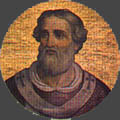 |
Hadrian IHadrian Colonna |
A Roman, scion of the aristocratic Colonna family. Lombard agents, led by Paul Afiarta, ran amok in Rome. They openly took control of the city and were preparing to install a Lombard Pope. The Romans, however, were having none of it. They rallied around Hadrian Colonna, electing him by acclamation and installing him in defiance of the Lombards. Hadrian made it his mission to drive the Lombards from Rome and break their power in Italy. Meanwhile, the Lombard King Desiderius decided this was the moment to act: a new, untried Pope sat in St. Peter's chair, and his Frankish allies were busy with a war in Saxony. He gathered his armies with the intention of destroying the Papal States and uniting Italy. It was a classic clash of will and purpose. The difference was that the Lombards actually had an army. As town after town fell, plundered and ravaged, to the inexorable Lombard advance, an increasingly desperate Pope Hadrian sent letter after letter to the Franks and organized a hasty refurbishment of Rome's walls. With the Lombards at the gates of Rome and the military situation desperate, word came at last that Charles and the Franks had crossed the alps. Charles put the Lombard capital of Pavia to siege. As Desiderius' forces retreated to defend their capital, Charles himself and a small force advanced to Rome, where they were received as heroes by the Romans. For four days, King Charles and Pope Hadrian talked. They got on famously, with Charles referring to the Pope as his "second father". Charles handed Hadrian a document promising him rule of most of Italy. He then rejoined his army at Pavia and, just two months later, he obliterated the Lombard army, killed their King, and laid waste to their capital. After two hundred years in Italy, the Kingdom of the Lombards was at last extinguished. Not bad for the first two years of his 23-year pontificate. What would Hadrian do for an encore? Why, take on the Byzantine Empire, of course! Determined that Iconoclasm had to go, Hadrian in 787 presided (through his legates) over the Second Ecumenical Council of Nicaea. He found an unlikely ally in the Empress Irene, who convinced her son Constantine VI to support the Council's findings. Hadrian's death in 795 produced an outpouring of grief throughout Christendom. |
 |
Saint Leo IIIAnno 795-816 |
A Roman; son of Atyuppius and Elizabeth. At the time of his election he was Cardinal-Priest of St. Susanna. Leo's pontificate began auspiciously enough; he was elected the very day of Hadrian's death, and the Frankish King Charles sent an enormous gift of treasure captured from the barbarian Avars. Within just a few years, however, some disgruntled relatives of ex-Pope Hadrian began making trouble. During a religious procession, the Pope was attacked in the street by a gang of armed thugs. The attempted to poke out his eyes with sharp sticks and rip out his tongue with tongs. He was left for dead, but eventually made it to a nearby monastery where he miraculously healed. With his enemies in pursuit, he fled north to Paderborn, when he caught up with King Charles. The King held a trial of sorts, where the Pope's enemies accused him of every crime they could think of, including adultery and, since he denied the charges, perjury as well. Charles sent the Pope back to Rome, where the Romans welcomed him back with joy and relief. Charles himself came to Rome the following year having decided the Pope's accusers were just a bunch of whiny brats. Against his better judgement, Charles allowed himself to be convinced by Leo not to kill the accusers. A few days later, on Christmas day of the year 800, Pope and King together attended mass. After the Gospel had been sung, Pope Leo tiptoed up behind Charles and slipped a crown on his head. In an inspired bit of theatre, the whole assembly began to shout: "To Charles, the most pious Augustus, crowned by God, to our great and pacific emperor life and victory!" To say that Charles was surprised is an understatement. He later said that if he'd known what the Pope was planning, he'd never have gone into the church that day. Charles was no longer merely King of the Franks; with one smooth move, Pope Leo had named him Charlemagne, Emperor of the West. The newly reconstituted Holy Roman Empire, initially the Papacy's chief protector, would become in time its chief rival. But that's for the future... |
Complete List of Popes
First Century |
Second Century |
Third Century |
Fourth Century |
Fifth Century
Sixth Century |
Seventh Century |
Eighth Century |
Ninth Century |
Tenth Century
Eleventh Century |
Twelfth Century |
Thirteenth Century |
Fourteenth Century |
Fifteenth Century
Sixteenth Century |
Seventeenth Century |
Eighteenth Century |
Ninteenth Century |
Twentieth Century
Twenty-First Century
Ecumenical Councils | Papal Box Scores